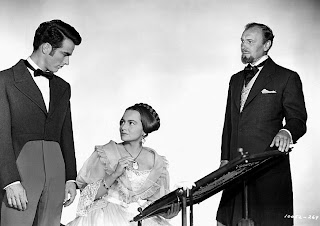Of the
three, great theatrical knights of the 20th Century, Laurence Olivier (1907-1989) always
came in third with Your Correspondent, trailing far behind both John Gielgud (1904-2000) and Ralph Richardson (1902-1983). Olivier was indeed a great actor, but he
lacked, to us, the poetry of Gielgud or the twinkle of Richardson.
However,
it becomes clear in reading this champion biography by Philip Ziegler (born 1929) that of the three, Olivier was the most
ambitious, the most tenacious and the most daring. For Olivier, becoming a great actor was less
a feat of artistry than an act of great will and determination. Throughout his life, Olivier would seemingly
set higher and more complex challenges for himself, stretching his powers as a
performer, as an advocate for the theater, and as a man. He sometimes fell far from his mark (most
notably as a man), but as a record of passion, energy and drive, Olivier is hard to beat.
Olivier
did not initially consider being an actor, but when his clergyman father (a
distant, rather brutal figure) told him that he would be on the stage (“of
course”), young Laurence took to it with alacrity. He was fortunate in his early roles and in
mentors … while still a young man, he was playing classical parts like Romero
and Mercutio, while also finding offers to star in mainstream movies. With successes in both Wuthering Heights (1939) and Rebecca
(1940), it would have been easy for Oliver to take the easy route and become a
movie star; instead, he stuck to his loftier ambition to become the premier
classical stage actor of his day.
However,
his success in film (something denied Gielgud and Richardson in their early
years) also provided Olivier with insight enough to know that cinema was an
important medium. While he claimed that
he didn’t fully understand ‘movie acting’ until rather late in the game, he was
wise enough to make large-scale movie adaptations of several Shakespeare plays
that provide us some clue as to his in-person dynamism. His film versions of Hamlet, Henry V and Richard III – both as director and star
-- are not only good Shakespeare, they are good movie-making.
But this
complete man of the theater was unsatisfied with performing and filmmaking; he
also wanted to be the man who created a National
Theater of Britain. It was a project
to which Olivier would dedicate more than a decade of his life and his not inconsiderable
energies. As star actor, occasional
director, business manager, spokesman and man-of-all work, Olivier faced the
Herculean task of building a national theater that showcased both the classics
and contemporary plays. It was not for
the faint of heart.
In a
book with more than its share of delicious gossip and screamingly-funny theater
bitchiness, Ziegler devotes most of the book to the almost day-to-day business
dealings of building the National. For
one of the foremost actors of his age, the great dramas of Olivier’s life were
born in board rooms, political gatherings and backstage meetings. More than just an actor-manager of the old
school, Olivier virtually carried the foundation, creation, formation and
survival of the National Theater on his back.
When the Board, in a stunning act of treachery, let him go after it was
up-and-running, Olivier’s physical and mental health were permanently hampered. It’s odd for a theatrical biography to read
like a business primer, but it is this heroic struggle that made Olivier so
interesting, and what makes Ziegler’s book so out of the ordinary.
This is
certainly a warts-in-all portrait, but more often it seems that Olivier was
more sinned-against than sinning. Ziegler
looks at Olivier the husband and father, as well as at Olivier the artist. It would seem that he was a man capable of
great generosity, kindness and wit – but a basilisk if you crossed him or got
in the way of his ambition. Like many
great men, he was a mixture of the petty and the perfect, of vaunting ambition
and piddling meanness.
For
those who love backstage stories, Ziegler does not disappoint. One of the more interesting revelations for
Your Correspondent was Olivier’s volcanic temper and gifted potty-mouth. At one point, Olivier calls fellow actor
Laurence Harvey a “fucking stupid, sniveling, little cunt-faced asshole.” Though hardly Shakespearen, such invective is
heroic.
But
these aren’t the stories that resonate with Ziegler, amusing as they are. Olivier had Olympian aspirations, and Ziegler
wisely reflects those aspirations in the story of his life, matching them up
against his very real achievements, which continue to reverberate in the world
of theater today. Ziegler, a biographer
of Lord Mountbatten, actually closes his biography with notes on the similarity
between the two men. This is a book for those
who long for star biographies, but with a little more depth. Highly recommended.






